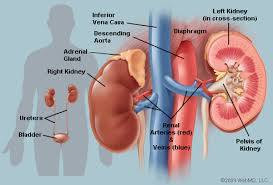Kidney Cancer: Symptoms, Diagnosis, and Treatment Hiranandani Hospital Kidney
Kidney cancer, also known as renal cancer, is a relatively uncommon but serious disease that affects thousands of individuals worldwide. L.H. Hiranandani Hospital, a leading healthcare institution renowned for its commitment to excellence in patient care, is at the forefront of diagnosing and treating kidney cancer. In this article, we will explore kidney cancer, its symptoms, diagnosis, and the advanced treatment options available here.
Kidney Cancer Overview:
Kidney cancer occurs when malignant cells form in the tissues of one or both kidneys. The kidneys, shaped like beans, are vital organs responsible for filtering blood and eliminating waste products from the body. Early detection and prompt treatment are crucial for improving the chances of a successful outcome.
Symptoms of Kidney Cancer:
- Blood in the Urine (Hematuria): One of the most common early signs of kidney cancer is the presence of blood in the urine. Hematuria can be painless and intermittent, making it essential to consult a healthcare professional even if it occurs infrequently.
- Pain or Discomfort: Persistent pain or discomfort in the side or lower back may indicate kidney cancer. Some patients describe it as a dull ache, while others experience sharp, severe pain.
- Lump or Mass: In some cases, a palpable lump or mass can be felt in the abdominal area. These masses are often discovered incidentally during routine physical exams or imaging studies.
- Unexplained Weight Loss: Kidney cancer can lead to unexplained weight loss, loss of appetite, and fatigue.
Diagnosis: Hiranandani Hospital Kidney Transplant offers state-of-the-art diagnostic methods to confirm kidney cancer, including:
- Imaging Studies: Advanced imaging techniques like CT scans, MRIs, and ultrasounds are employed to visualize the kidneys and any potential tumors.
- Biopsy: A biopsy may be performed to analyze a tissue sample from the kidney, confirming the presence of cancer and determining its type and stage.
- Blood and Urine Tests: Blood tests can identify certain markers associated with kidney cancer, while urine tests can detect blood and abnormal cells.
Treatment Options at Hiranandani Hospital Kidney care : Once a diagnosis is confirmed, the multidisciplinary team develops a personalized treatment plan. Treatment options for kidney cancer may include:
- Surgery: Surgical removal of the affected kidney (nephrectomy) or a portion of it (partial nephrectomy) is often the primary treatment for kidney cancer.
- Minimally Invasive Procedures: They specialise in minimally invasive techniques such as laparoscopic or robotic-assisted surgery, which offer faster recovery and fewer complications.
- Radiation Therapy: In some cases, radiation therapy may be used to target cancer cells with high-energy radiation beams.
- Targeted Therapies: Targeted therapies aim to inhibit specific molecules that promote cancer growth. These drugs can be effective for advanced or metastatic kidney cancer.
- Immunotherapy: Immunotherapy helps boost the body’s immune system to fight cancer cells effectively.
Conclusion:
Kidney cancer is a serious condition, but early detection and treatment can significantly improve outcomes. Hiranandani Hospital Kidney, with its cutting-edge diagnostic tools and a team of experienced oncologists, offers comprehensive care for individuals diagnosed with kidney cancer. If you or a loved one are experiencing symptoms or have concerns about kidney health, do not hesitate to seek expert medical advice and consider the hospital as a trusted partner in your healthcare journey.



Comments
Post a Comment